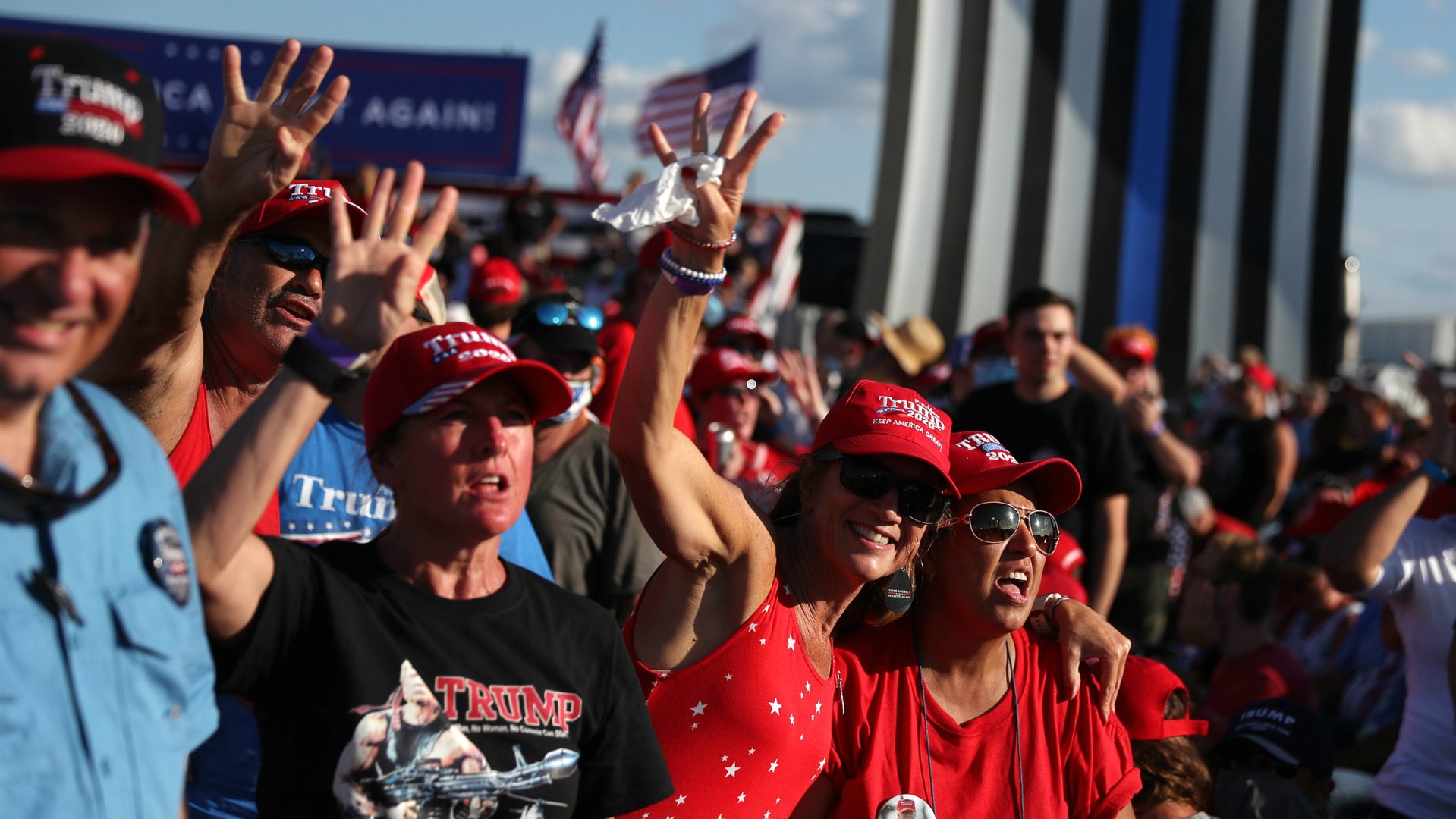While white evangelicals’ support for President Donald Trump is close to the strong backing he enjoyed in 2016, voters’ motivations have shifted during his first term at the White House.
This year, a majority are excited to get behind Trump, rather than being primarily motivated by a distaste for his opponent. Among white evangelical Trump supporters, most characterize their vote in 2020 as “for Trump” (57%) and not “against Joe Biden” (20%), according to new Pew Research Center survey breakouts provided to CT.
Last presidential election, the numbers told a different story. White evangelicals voting for the Republican were more likely to say their vote was “against Clinton” (45%) than “for Trump” (30%) in Pew’s 2016 survey—which researchers caution isn’t directly comparable to the recent numbers because it was done by phone, while this year’s was done online.
Tony Suarez, executive vice president of the National Hispanic Christian Leadership Conference, says four years will change your perspective. He served on Trump’s faith advisory panel leading up to the 2016 election. This time, he’s actively campaigning for reelection.
“Now I’m more than an adviser,” said Suarez, who has spoken at Evangelicals for Trump events around the country. “It’s my call because of what I’ve seen in the last four years. … He respects prayer, receives prayer, and respects the faith community, but he gets a bad rap.”
Trump’s reputation is also an animating factor on the Left, where more Biden voters overall say they are voting “against Trump” than “for Biden.”
The only religious group that considers itself “for Biden” is black Protestants; 90 percent back the former vice president and over half say they are voting for him and not against the current president, Pew found. In comparison, among the 17 percent of white evangelicals who lean toward Biden, three-quarters say they are motivated to vote “against Trump.”
Nathan Hoag, an evangelical pastor in Colorado, says his choice to vote Democrat “has little to do with my approval of Biden and almost everything to do with my disapproval of Trump.” He said the decision was easier this year after seeing four years of the administration’s policies.
Though it’s still a minority position among white evangelicals, faith-based opposition to Trump has grown far more organized in 2020 and is focusing on the concerns shared by voters like Hoag.
Not Our Faith, a bipartisan Christian super PAC whose advisers include former Obama staffer Michael Wear, is the latest effort to launch. The organization will join a burgeoning number—Republican Voters Against Trump, Christians Against Trumpism, Evangelicals for Biden, and Pro-Life Evangelicals for Biden—formed to rally believers to vote the current president out of office.
The increasingly vocal opposition cites Christian convictions around issues like racism, health care, poverty, and climate science, as well as concerns with Trump’s tone.
“We believe Christians who use, excuse and embrace toxic rhetoric to achieve specific policy ‘wins’ are short-sighted and wrong,” stated Christians Against Trumpism.
Pro-Life Evangelicals for Biden said that beyond abortion, “Joe Biden’s policies are more consistent with the biblically shaped ethic of life than those of Donald Trump.”
Suarez and other evangelicals siding with the president have pushed back against the evangelical minority speaking up for Biden.
The president still feels the love from his evangelical base. On a prayer call on Sunday evening, he said, “Whether it’s evangelical, whether it’s Christian evangelical, call it whatever you want, people of religion, this is the most important election of our lives. We have got to get out and we have to vote.”
Joined by his daughter-in-law Lara Trump, pastor Paula White-Cain, and other evangelical leaders who have joined campaign efforts, the president—less than a week after being discharged from his coronavirus hospitalization—offered up his prayers.
“I want to thank God for working miracles, and I want to ask God for the wisdom and grace to lead our country and to lead it on the top level,” Trump said to more than 100,000 supporters tuning in. “We’re going to make America greater than ever before.”
For white evangelicals who have stood by Trump, this is what they see from the president: a leader who prays and welcomes their prayers and who has kept his promises to improve the economy, uphold pro-life stances, and appoint conservative justices.
Like white evangelicals overall, evangelical pastors have grown more confident in the president. At this point in 2016, they were more likely to say they didn’t know whom they’d vote for than to side with candidate Trump, according to a LifeWay Research survey.
This year’s survey found that more than two-thirds of evangelical pastors plan to vote for Trump (68%). LifeWay found that Pentecostal (70%) and Baptist pastors (67%) are more likely to vote for Trump than pastors in the Restorationist movement (49%), Lutherans (43%), Presbyterian/Reformed (24%), or Methodists (22%).
The racial divide among evangelical voters holds for pastors too. Only 6 percent of African American pastors say they support Trump, while a majority (61%) will be voting for Biden.










